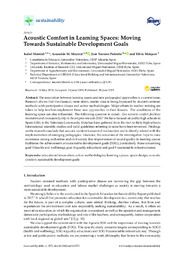Por favor, use este identificador para citar o enlazar este ítem:
https://hdl.handle.net/11000/34231Registro completo de metadatos
| Campo DC | Valor | Lengua/Idioma |
|---|---|---|
| dc.contributor.author | Montiel Vaquer, Isabel | - |
| dc.contributor.author | Martínez Mayoral, Mª Asunción | - |
| dc.contributor.author | Navarro-Pedreño, Jose | - |
| dc.contributor.author | Maiques, Silvia | - |
| dc.contributor.other | Departamentos de la UMH::Estadística, Matemáticas e Informática | es_ES |
| dc.date.accessioned | 2025-01-09T09:02:03Z | - |
| dc.date.available | 2025-01-09T09:02:03Z | - |
| dc.date.created | 2019-06 | - |
| dc.identifier.citation | Sustainability 2019, 11, 3573 | es_ES |
| dc.identifier.issn | 2071-1050 | - |
| dc.identifier.uri | https://hdl.handle.net/11000/34231 | - |
| dc.description.abstract | The association between learning spaces and new pedagogical approaches is a current issue. Research shows that the classical, more silent, master class is being bypassed by student centered methods with participative classes and active methodologies. Major efforts in teacher training are taken to help teachers implement these new approaches in their lessons. The conditions of the learning space are also influential. The following question is raised: Can acoustic comfort facilitate innovation and consequently help in the progress towards SDG? We have focused on public high schools in Spain (IES), in the Valencian Community. Data has been gathered from the visit to thirty high schools. International scientific studies and valid guidelines referring to noise have been reviewed. Findings on the research conclude that acoustic comfort is essential in education and is directly related with the implementation of emerging pedagogies. Likewise, the outcomes of the investigation hope to raise awareness among authorities and civil society that improvement of sound quality in learning spaces facilitates the achievement of sustainable development goals (SDG), particularly those concerning goal 3 (health and wellbeing), goal 4 (quality education) and goal 9 (sustainable infrastructures). | es_ES |
| dc.format | application/pdf | es_ES |
| dc.format.extent | 18 | es_ES |
| dc.language.iso | eng | es_ES |
| dc.publisher | MDPI | es_ES |
| dc.rights | info:eu-repo/semantics/openAccess | es_ES |
| dc.rights | Attribution-NonCommercial-NoDerivatives 4.0 Internacional | * |
| dc.rights.uri | http://creativecommons.org/licenses/by-nc-nd/4.0/ | * |
| dc.subject | educational innovation | es_ES |
| dc.subject | active methodologies | es_ES |
| dc.subject | learning spaces | es_ES |
| dc.subject | space design | es_ES |
| dc.subject | acoustic comfort | es_ES |
| dc.subject | sustainable development goals | es_ES |
| dc.subject.other | CDU::6 - Ciencias aplicadas::60 - Cuestiones generales de las ciencias aplicadas | es_ES |
| dc.title | Acoustic Comfort in Learning Spaces: Moving Towards Sustainable Development Goals | es_ES |
| dc.type | info:eu-repo/semantics/article | es_ES |
| dc.relation.publisherversion | https://doi.org/10.3390/su11133573 | es_ES |

Ver/Abrir:
Acoustic_Comfort_in_Learning_Spaces_Moving_Towards (1).pdf
3,54 MB
Adobe PDF
Compartir:
 La licencia se describe como: Atribución-NonComercial-NoDerivada 4.0 Internacional.
La licencia se describe como: Atribución-NonComercial-NoDerivada 4.0 Internacional.
.png)